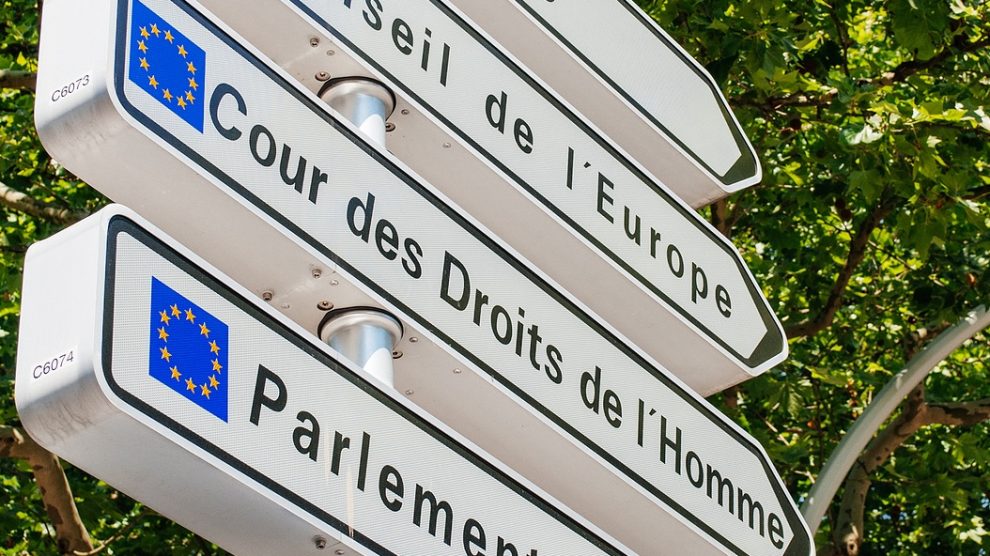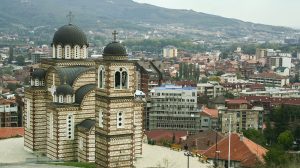With an appeal to Georgia’s Constitutional Court to strike down an anti-European law likely to be in vain, civil society should turn to the European Court of Human Rights.
With Georgia’s freedom hanging by a thread, Georgian civil society and non-governmental organisations must urgently seek support from European institutions such as the European Court of Human Rights (ECHR).
However, with the country’s controversial ‘foreign agent’ law no having taken effect and parliamentary elections fast approaching, their window to shield civil society from authoritarian consolidation is rapidly closing.
- Salome Zourabichvili: A steadfast leader in turbulent times
- Football, protests, and the emergence of New Georgia
- ‘It’s never been easier to pick a side’
The ‘foreign agent’ law has been hard to miss. Pushed through by the governing Georgian Dream party, it sparked mass protests throughout the country earlier this year.
The bill prescribes that organisations receiving more than 20 per cent of their funding from abroad must register as ‘pursuing the interests of a foreign power’. This is problematic since the bill could easily be used to suppress civil society and crack down on opposition voices, which is exactly how a similar law was used in Russia.
Given the use of Russia-like rhetoric by Georgian Dream officials, it is no wonder the bill is facing criticism for its Russian-like design. Georgians, who are all too familiar with Russian oppression, saw the writing on the wall and took to the streets enmasse to protest. In truly authoritarian fashion, the freedom fighters were violently shut down by the regime’s ‘masked cowards’, the riot police deployed to maintain public order.
Despite the protests, diplomatic pressure, sanctions, frozen EU financial aid and a presidential veto, the bill became law on August 1, threatening the crucial work of CSOs’ and NGOs’ in exposing alleged corruption, conflicts of interest, and bad governance. With elections approaching, it’s clear the bill is politically motivated.
On July 17, Georgian Dream announced the slogan for its upcoming election campaign: ‘To Europe only with peace, dignity and prosperity’. After having ruthlessly sabotaged the country’s Euro-Atlantic integration, this is beyond shameless, even for former prime minister Bidzina Ivanishvili, Georgia’s ‘billionaire puppet master’, and his clan.
Their actions have caused the EU aspirations of Georgians to go up in smoke, raising questions about how and if Georgian Dream plans to repair Tbilisi’s relationship with Brussels.
A challenge with ‘no prospects’
That’s why President Salome Zourabichvili, 121 Georgian CSOs and media organisations and 32 opposition lawmakers decided to challenge the foreign agent law in the country’s Constitutional Court.
According to Article 78 of the Georgian constitution, “constitutional bodies shall take all measures within the scope of their competencies to ensure the full integration of Georgia into the European Union and the North Atlantic Treaty Organisation”.
Since Georgian Dream is doing the opposite, victory for the president and her co-signatories might be thought of as a foregone conclusion. Unfortunately, thanks to Georgian Dream, things which should be straightforward rarely are.
Ivanishvili’s unwavering ally, the current prime minister Irakli Kobakhidze, has said President Zourabichvili’s lawsuit “will have no prospects”. He didn’t say this because there is no legal basis for it, but because he knows the judicial system is effectively under the control of the ‘Clan’.
This influential group of judges is known to have a pact with the Georgian Dream authorities to decide important court cases in favour of the ruling party in exchange for personal benefits. It is safe to say none of the domestic lawsuits will yield any results and that they will drag on until after the elections.
The role of the ECHR
That’s why the freedom fighters filing those lawsuits must instead focus their attentions towards the European Court of Human Rights.
Generally, applicants must exhaust all domestic remedies before bringing a case to the ECHR. However, considering the ample evidence of judicial corruption in Georgia and the well-documented intimidation of independent journalists and activists, there is a solid foundation to appeal for an exemption. After all, the ECHR has allowed such exemptions before. If they are truly committed to safeguarding democracy and the rule of law, it should be a no-brainer.
In the meantime, freedom fighters can invoke ECHR Rule 39 to request the temporary suspension of enforcement of the foreign agent law. This legal mechanism allows the ECHR to impose urgent interim measures in situations where there is, “an imminent risk of irreparable harm”. Given the undeniable potential for lasting damage to Georgia’s civil society and democratic institutions, Rule 39 would be more than justified.
Swift action is required. With the bill having just taken effect, there is no time to lose—and everything to lose.
Unlike many news and information platforms, Emerging Europe is free to read, and always will be. There is no paywall here. We are independent, not affiliated with nor representing any political party or business organisation. We want the very best for emerging Europe, nothing more, nothing less. Your support will help us continue to spread the word about this amazing region.
You can contribute here. Thank you.







Add Comment